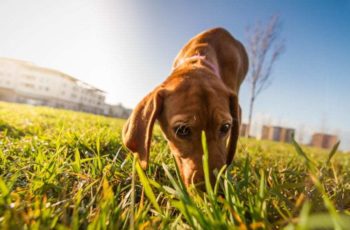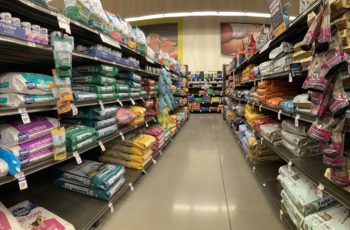Affenpinscher By Janice Jones |Last Updated 05-14-2021
If you’re looking for a spunky dog that is totally devoted to you, relatively easy to train, and fun to be with, you may want to consider the Affenpinscher.
Affenpinscher pronounced, (‘Affen-pincher’) meaning
Monkey Terrier, in German and The French refer to this breed as Diablotin
Moustachu which means ‘Mustached Little Devil.”
This is a rare breed in the United States,
but has come to the attention of many people in the dog world because of the 2013 Westminster Dog Show’s Best
of Show, Banana Joe.
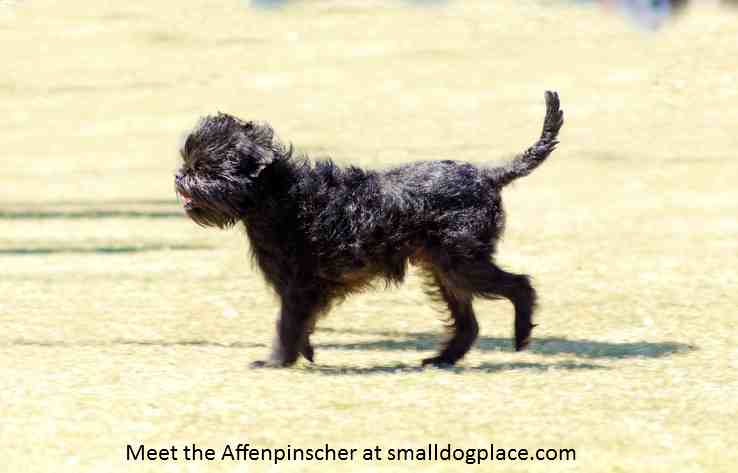
Quick Facts
Other Names Used: Monkey Face, Mustached Little Devil
Affiliation: AKC: Toy Breed, UK: Companion, CKC: Toy
Coat Type: Wiry
Colors: Black, grey, silver, red, black and tan, or beige
(mixed black, white, brown and red hairs), all with or without black mask
Activity Level: Moderate
Life Expectancy: 11-14 years
Good with Children:
Not recommended for small children
Good with other pets: Yes
Litter Size: 2-3 Puppies
Average Cost: $1000-2500
Personality/Temperament
| Traits | Rating |
|---|---|
| Playfulness | |
| Affection Level | |
| Friendliness Towards Strangers | |
| Good with Children | |
| Good with Other Dogs | |
| Good for First Time Owners | |
| Exercise Needed | |
| Ease of Training | |
| Watch Dog Ability | |
| Grooming Requirements | |
| Shedding | |
| Cold Tolerant | |
| Heat Tolerant |
Explanations for At a Glance Ratings
- Playfulness: Most=5 Less=1
- Affection: Most=5 Least=1
- Friendliness Towards Strangers: Most=5 Least=1
- Good with Children: Good=5 Not Good=1
- Good with Other Dogs: Good=5 Not Good=1
- Good for First Time Owners: Good=5 Not Good=1
- Amount of Exercise Required: Much=5 Minimal=1
- Ease of Training: Easy=5 Difficult=1
- Watch Dog Ability: Excellent=5 Poor=1
- Grooming Needs: Extensive=5 Minimal=1
- Shedding: Heavy Shedding=5 Minimal Shedding=1
- Cold Tolerance: Cold Well Tolerated=5 Poorly Tolerated=1
- Heat Tolerance: Heat Well Tolerated=5 Poorly Tolerated=1
The Affenpinscher is a bold,
alert, loving and very loyal breed. Additional
words that describe his personality include Fun-loving, Spunky,
Curious, Adventurous, Stubborn, Playful, and
Active.
He is inquisitive and
intelligent, and generally quiet unless he hears a noise and then you’ll hear a
different side to him. He is a companion dogs and need to live indoors near his
favorite people.
He is the quintessential, small
dog with a big attitude. He has no sense
of size, so you will need to protect him from himself.
He is an active breed that enjoys a daily
walk, but much of his exercise requirements can be met indoors. This is one breed that will keep you entertained.
This
breed tends to conform to the activity needs of the people who love him, so in
other words, he will be just as content to sit on the couch as you watch
television or take a brisk walk outdoors if you are more of the active
type.
He can be a little athlete and
does well in agility, obedience or rally.
His tiny size makes it easy to carry him around, but he is happier
walking on his own.
As is the case with many small
breed dogs, these dogs are difficult to housebreak. Crate training is often recommended for this
breed.
History
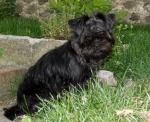
This breed originated in
Central Europe, most likely Germany and France back in the 17th
century.
He was originally bred to chase
rodents in stables, homes, farms, and shops.
The original dogs of this breed were much larger. Over time, breeders reduced their size and
made them companion dogs.
It is thought
that they were crossed with pugs, German Pinschers, and a dog called a German
Silky Pincher to get their characteristic look.
They were later used in the creation of other breeds including the
Brussels griffon and Miniature Schnauzer.
They are still known to be good at catching mice and other small pests
but are classified as a companion dog.
Coat & Grooming
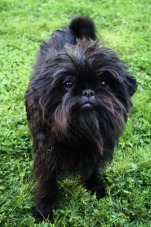
These guys need brushing and combing twice a week and
plucking a couple times a year. Many people opt for professional grooming, but it is possible to do-it-yourself.
Brushing is best accomplished using a slicker
brush and a greyhound comb; both tools that will help keep any tangles from
turning into mats.
Plucking is usually done by a professional
groomer but if you want to do it yourself, there is a very good tutorial at the
Affenpinscher Club of America Website.
The Affenpinscher has a thick, rough coat with a harsh wiry texture
that grows to about one inch long on the body but a little shorter on the rump
and tail, and lengthier and bushier on the head, neck, chest, stomach, and
legs.
The longer fur around the head and shoulders resembles a cape which gives
him that characteristic monkey like appearance.
They don’t shed much which
makes some believe that they are non-shedding.
They do shed but are considered more hypoallergenic than most.
You will want to purchase a slicker brush and greyhound comb for routine brushing and combing. If you chose to puck hairs, you will also need a medium size raking knife.
Other than coat care, you will not want to neglect your dog’s dental needs. These dogs tend to have teeth issues so brushing their teeth as often as possible is very important.
Nails need to be trimmed or ground down about every two weeks.
The hair inside of the ear continues to grow and will need to be removed and ears cleaned about once a week. Use a good quality ear powder and either your fingers or a hemostat to gently remove a few hairs at a time. Most dogs do not like this procedure but if you only remove a few hairs at a time, they will be more likely to tolerate your efforts.
Health Concerns of the Affenpinscher
While not a health problem in the traditional disease model, Affenpinschers are most susceptible to injury. Bone fractures are common due to jumping off furniture, falling, or trying to leap out of your arms. They are fast and can be stepped on easily. Choking is also a concern even with very tiny objects.
Since they are so small, they can squeeze through even small openings in a fence and be gone in an instant, sadly ending up in the road.
Other problems include:
- Heart Problems (patent ductus arteriosus and mitral valve disease)
- Eye Problems include Cataracts, glaucoma, corneal ulcers, dry eye and tear duct disorders.
If you are working with a breeder it is recommended that you ask about what tests are performed on the parents.
Excellent breeders will run DNA tests, have eyes checked, and get hips X-rayed before making breeding decisions.
Feeding Your Affenpinschser
A high quality diet that is designed for small breed dogs is the first step towards offering your dog the nutrition he needs to thrive. Meals should be offered twice a day for adult dogs and 3 times a day for puppies up to 6 months of age.
A high quality formula will always have a named meat-based protein as the first ingredient such as chicken or lamb. More than one meat based proteins in the first seven ingredients are highly recommended.
To prevent obesity, choose your treats wisely. Tiny bits of commercially available treats can be used for training purposes or make your own using real chicken, turkey or other meat source. Vegetables and fruits are another good choice of treats, but there are some foods that Affenpinschers should never eat.
Best Owners for Affenpinschers
Affenpinschers do well with calm older children but are not recommended for families with babies, toddlers and young preschool aged children. Singles and Seniors are also great choices for this breed and these dogs do well for first-time owners because of their ease of training.
They do have a tendency to bark, so take that into consideration if you live in an apartment. A home with a fenced in yard is ideal. They need room to run and play, but can get most of their exercise requirements through a couple daily walks.
Affenpinscher don’t do well being left alone for long periods of time, so the ideal owner will have a flexible schedule or arrange for someone to check in a couple times a day to walk and play with their dog. Separation anxiety is a problem in this breed, so the perfect situation for this breed would be for at least one stay-at-home parent.
Energy Level and Exercise Requirements
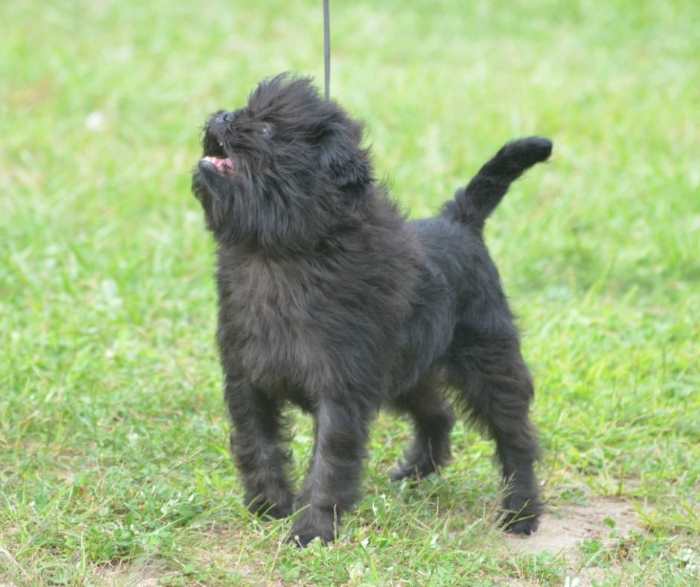
This breed is active and needs exercise daily to keep them happy and fit. Several short walks are preferable than one very long walk. They enjoy walking but do not have the endurance for rigorous hikes or lengthy walks.
Monitor your dog during exercise for signs of fatigue and difficult breathing. They are considered to be a brachycephalic breed and all the symptoms that go along with brachycephalic syndrome may become a problem. Opt for a harness rather than a collar when walking them on a leash.
Some of their exercise needs can be met through active play either indoors or outside in a fenced in area. If you do take your dog to a dog park, assure that they are up-to-date on all of their vaccinations.
Training an Affenpinscher
Affenpinschers are very smart and respond well to a positive gentle approach to training manners and basic commands. Housebreaking, however may be more problematic.
Just like most small breed dogs, housebreaking takes more time and patience than it would if training a larger dog.
Socialize your puppy from day one to wide variety of people, other dogs and different kinds of animals. Some Affenpinschers are reserved around strangers so introducing him to a diverse group of people will help him become less shy of strangers.
Some Affenpinschers are more vocal than others, so if you have a barker it is important to address that problem as a puppy.
Pros of Living with an
Affenpinscher:
- Good Watch dog
- more energetic than most dogs his size
- Minimal shedding
- Good with older children
- Playful, fun personality
- Has not been over bred
Cons:
- Can be difficult to housebreak
- intact males “mark” their territory
- Regular grooming, including stripping his
coat of dead hairs to keep the shaggy but neat appearance - Intelligent but may be stubborn, does best
with firm, consistent, positive training - Expensive to purchase
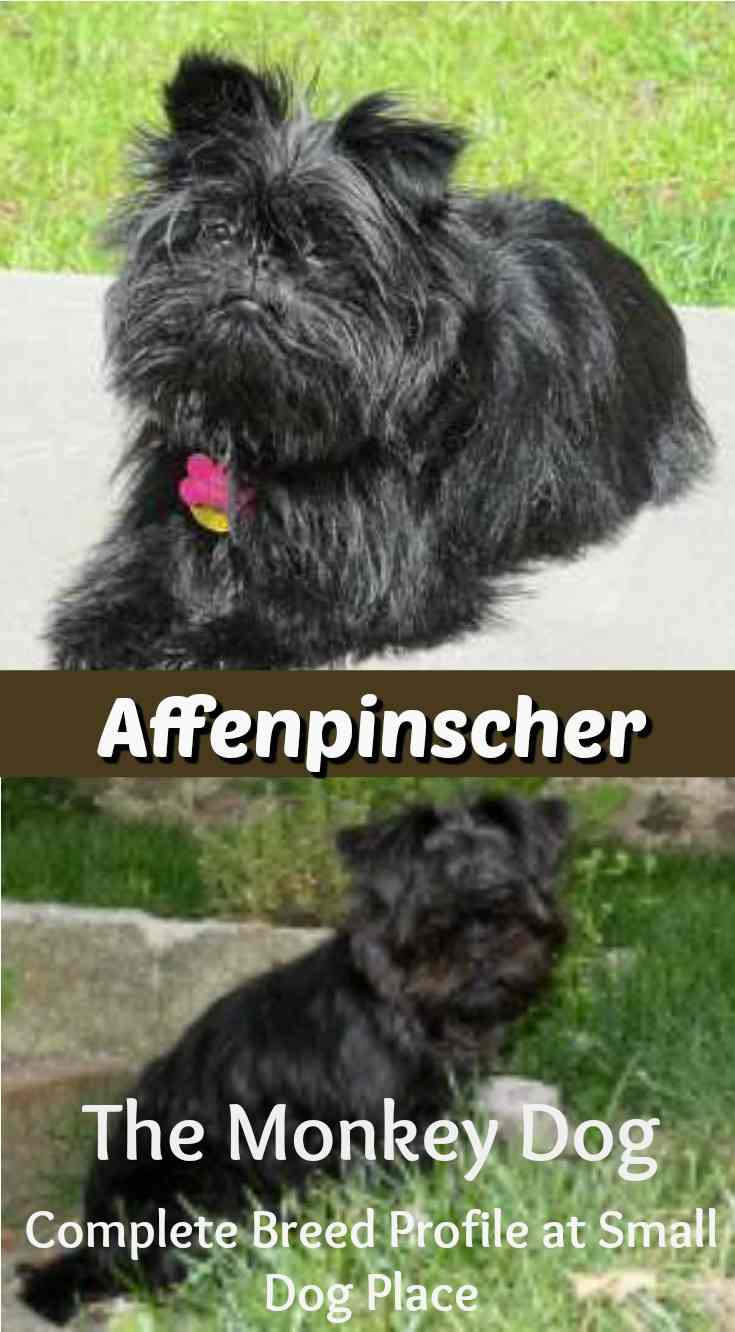 Affenpinscher or Monkey Dog: The Complete Breed Profile: Is the breed right for you?
Affenpinscher or Monkey Dog: The Complete Breed Profile: Is the breed right for you?References and Further Reading
It is always important to do as much research as possible about a breed you are considering. Here are a few links and books that might help with that decision making.
The American Kennel Club Affenpinscher Breed Profile
Affenpinscher Rescue of America
Does This Article Deserve Your Thumbs Up?
We always appreciate your support and encouragement. Your thumbs up means so much to us. Please like this article.
If you find this page or any page on Small Dog Place Helpful, or Useful in anyway, I’d love it if you would click the small heart found on the bottom right of each page.
You can also share or bookmark this page — just click on the:

Free Monthly Newsletter
Sign Up for Our Free Newsletter and get our Free Gift to You.
my E-book, The Top 10 Mistakes People Make When Choosing a Dog (and how to avoid them)

